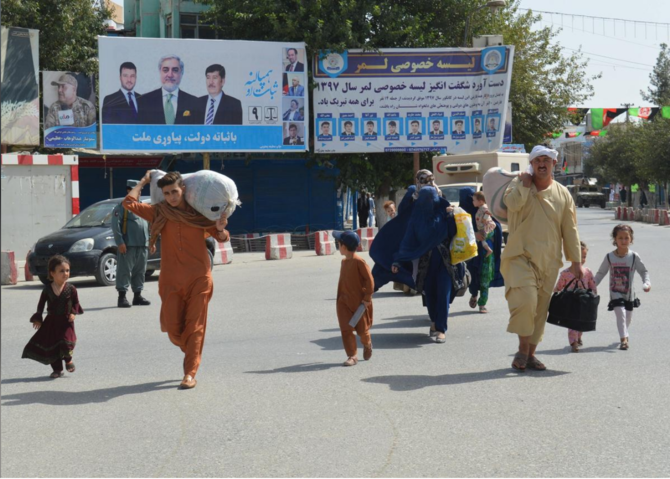KABUL: Taliban guerrillas staged attacks on another city in northern Afghanistan on Sunday, increasing pressure on the central government ahead of crucial presidential polls slated for later this month and hours after the group concluded a round of talks with US diplomats.
The attack on Pul-i-Khumri, the provincial capital of Baghlan came a day after the Taliban broke government defense lines and entered parts of adjacent Kunduz city where the group continues to have some presence, locals told Arab News.
The defense ministry in a statement said that local uprising forces had foiled the Taliban assaults in atleast two directions of Pul-i-Khumri, which lies along the strategic highway that links much of southern Afghanistan with the north and with Central Asia.
However, Mohammad Azim Mohseni, a lawmaker from Baghlan said that the Taliban had presence in atleast four areas of the city where intense fighting had raged since the militants began their strikes early before dawn.
“The Taliban have entered in the city, this is the first time that they have managed to do so. The city is shut,” Mohseni told Arab News by phone.
He said the Taliban had also blocked the highway that runs through the city.
The interior ministry said Taliban fighters who had fled the Kunduz clearance operations by the government, were involved in the attack on Pul-I-Khumri.
Mohseni could not say how many Taliban fighters had participated in the assault on the city, but added that the fighters belonged to various parts of the country, including Baghlan.
The Taliban attacks on Kunduz and Baghlan, following their gains in some other northern areas in recent days, show according to analysts an intelligence failure in the government and may put it under further pressure ahead of Sept. 28th presidential elections.
Afghan analyst Fazl Rahman Orya, beelives that by spreading and stepping such attacks, the Taliban wants to show further weakness of the government which has been left out of nine rounds of talks between the militants and US diplomats in Qatar.
“These attacks come as US and Taliban emissaries are wrapping up their 9th round of talks. The Taliban want to show that the government is weak and from other side want to show its military might so that they have the upper hand in future intra-Afghan dialogue,” he told Arab News.
US envoy, Zalmay Khalilzad who has led the talks with the Taliban is heading to Kabul on Sunday for talks with government leaders about the conclusion of the last round of discussions.
Both Khalilzad and the Taliban said they nearing a final deal.
“We are at the threshold of an agreement that will reduce violence and open the door for Afghans to sit together to negotiate an honorable & sustainable peace and a unified, sovereign Afghanistan that does not threaten the United States, its allies, or any other country,” Khalilzad said in a tweet on Sunday.
Suhail Shaheen, Taliban spokesman based in Qatar in a tweet said the agreement will mean end of “occupation and peaceful settlement of Afghanistan’s crisis,”.
Taliban seize territory in northern Afghan city in second major attack
Taliban seize territory in northern Afghan city in second major attack

- Could derail crucial elections and peace talks that have been months in the making
- Officials said fighters hail from various parts of the country, including Baghlan
Pakistan among top five nations with most people living in poverty — UN report

- Around 38.3 percent of Pakistanis live in multidimensional poverty, says United Nations’ annual report on Pakistan
- Pakistan ranks 142 out of 146 on Global Gender Gap Index, highlighting disparities in women’s and girls’ economic participation
ISLAMABAD: Pakistan ranks among the top five countries with the highest number of people living in poverty, the United Nations Development Programme said in its annual report recently, stating that 38.3 percent of the nation’s population experiences multidimensional poverty.
Poverty in Pakistan remains a complex challenge, exacerbated by a prolonged macroeconomic crisis that Islamabad is desperately trying to escape. Poor people in Pakistan have to face challenges in the form of lack of social protection and economic benefits, especially in informal jobs.
“According to the latest Multidimensional Poverty Index, Pakistan is among the five countries with the highest number of people living in poverty,” the UNDP said in its 2024 report on Pakistan, released on March 14.
“Around 38.3 percent of the population lives in multidimensional poverty, while 12.9 percent are vulnerable to falling into this category.”
Multidimensional poverty is a way of measuring poverty beyond income alone. It recognizes that people can experience multiple, overlapping deprivations that affect their well-being and quality of life.
These deprivations can include limited access to basic services such as access to clean water, electricity, health and sanitation facilities.
Separately, the report ranked Pakistan 142 out of 146 on the Global Gender Gap Index, highlighting significant disparities in economic participation, political representation, and access to opportunities for women and girls.
“Ahead of Pakistan’s general elections, UNDP’s voter education campaign reached 85 million people, including 31 million women,” it added.
“This effort contributed to the registration of over 100,000 new voters, primarily women, raising women’s voter turnout to 43 percent in 2024, up from 39.7 percent in 2018.”
The Index is a benchmark tool developed by the World Economic Forum to measure gender-based disparities across countries. It evaluates how equitably resources and opportunities are distributed between men and women, regardless of overall income levels or development.
Gender disparity is a significant issue in Pakistan, characterized by unequal opportunities, wage gaps and underrepresentation of women in leadership and decision-making roles.
Cultural norms and traditional gender roles often limit women’s participation in various sectors mostly dominated by men.
Temperatures in Pakistan may hit 50°C this week, a global record — report

- Wednesday and Thursday might be the hottest April days for Pakistan, says report
- Says Pakistan recorded temperatures over 4 degrees above average so far this month
ISLAMABAD: Temperatures in central and southern Pakistan may surge to 50°C this week, nearing the global record for the highest temperature ever recorded in April, as per a report by American newspaper The Washington Post.
The warning comes amid increasingly unpredictable climate patterns across South Asia, with several cities in Pakistan’s southern Sindh province such as Karachi experiencing more frequent and intense heatwaves in recent years— a trend that climate experts attribute to broader shifts caused by global warming.
The situation underscores rising concerns over Pakistan’s preparedness for extreme weather events amid growing calls for stronger climate adaptation policies, increased tree cover in urban areas and more effective public awareness campaigns.
“Temperatures in central and southern Pakistan rose to 118 degrees Fahrenheit (47.8°C) last weekend and are forecast to climb through Wednesday, possibly nearing the global April record of 122 degrees Fahrenheit (50°C),” The Washington Post said in a report.
“Heat will build across the Middle East and South Asia through the week, with Wednesday and Thursday looking like the hottest days for Pakistan.”
It added that Sindh’s Nawabshah city had reached the 50°C mark back in April 2018 and could repeat the same this week. Nawabshah recorded a temperature of 50.2°C back then and set a new global record for the highest temperature ever observed in April.
The report said “a sprawling dome of high pressure like a heavy lid trapping heat in a pot” was causing the current heat wave, stretching from the Middle East to South Asia. It noted that this area experiences the Earth’s most unusually warm temperatures during April.
It quoted the European Center for Medium-Range Weather Forecasts as predicting the maximum temperature to remain around 50°C in central Pakistan on Wednesday and Thursday.
“Temperatures have been more than 4 degrees above average in Pakistan so far this April, even before the arrival of this week’s potentially record-breaking heat,” it added.
Pakistan ranks among the top ten countries most vulnerable to climate change, grappling with increasingly frequent extreme weather events from deadly heatwaves to devastating floods.
The 2015 heatwave claimed over 2,000 lives in Karachi alone while the 2022 floods left more than 1,700 dead and over 33 million displaced nationwide.
‘Strive for peace’: Saudi Arabia seeks de-escalation of Pakistan-India tensions

- Riyadh urges neighbors to resolve disagreements through diplomatic channels, strive for stability and peace for their people and region
- Tensions have surged following attack on tourists in Indian-administered Kashmir that New Delhi blames on Pakistan, which denies the charge
ISLAMABAD: Saudi Arabia has expressed concern over heightened tensions between nuclear-armed neighbors Pakistan and India amid exchanges of fire along their disputed border separating Kashmir and fears of an Indian military incursion, state news agency SPA reported on Wednesday.
Relations have plummeted following a deadly attack on tourists in Indian-administered Kashmir on Apr. 22 that New Delhi has said Pakistan was involved in. Islamabad denies the charges. Fears have risen since that India may conduct limited airstrikes or special forces raids near its border with Pakistan.
Pakistan’s information minister said on Tuesday night the country had “credible intelligence” India intended to carry out military action against it in the “next 24-36 hours on the pretext of baseless and concocted allegations of involvement in the Pahalgam incident.”
“The Kingdom appealed to both nations to de-escalate, avoid further escalation, resolve their disagreements through diplomatic channels, uphold the principles of good neighborliness, and strive for stability and peace for the welfare of their people and region,” SPA said.
Meanwhile United Nations Secretary-General Antonio Guterres spoke separately on Tuesday with Pakistan’s Prime Minister Shebaz Sharif and India’s Foreign Minister Subrahmanyam Jaishankar.
“The Secretary-General also expressed his deep concern at rising tensions between India and Pakistan and underscored the need to avoid a confrontation that could result in tragic consequences. He offered his Good Offices to support de-escalation efforts,” UN spokesperson Stephane Dujarric said.
The US State Department has also said Washington was in touch with both India and Pakistan while urging them to work toward what it called a “responsible solution.”
In public, the US government has expressed support for India after the attack but has not criticized Pakistan.
Since the attack, in addition to soldiers shooting over the Line of Control frontier that divides disputed Kashmir between the two nations, India and Pakistan have announced tit-for-tat diplomatic measures that included cancelation of visas and a recall of diplomats.
New Delhi also suspended a crucial water-sharing treaty with Islamabad and ordered its border shut with Pakistan. In response, Pakistan has closed its airspace to Indian airlines.
Kashmir is disputed between India and Pakistan since 1947, with both ruling it in part but claiming it in full.
Pilgrims begin arriving in Madinah as Pakistan launches Hajj flights operation

- Over 89,000 pilgrims will travel under the government’s scheme, traveling to Makkah and Madinah via 342 flights
- Pilgrims from Karachi and Islamabad are availing Makkah Route Initiative designed to streamline immigration process
ISLAMABAD: Pakistani pilgrims who will perform the annual Hajj pilgrimage this year under the government scheme began arriving in Madinah this week as Pakistan kicked off its 33-day-long Hajj flight operation.
Over 89,000 pilgrims will travel under the government’s scheme, departing for Makkah and Madinah via 342 flights, with the last one departing from Pakistan on May 31. The first Hajj flights departed from Islamabad, Lahore, Karachi and Quetta for the Saudi city of Madinah on Tuesday.
“First flight carrying 393 pilgrims from Islamabad landed at Prince Mohammad bin Abdulaziz International Airport,” Radio Pakistan reported on Wednesday.
“The intending pilgrims were transported to their residences in special buses. Later, they were warmly received at their hotels and presented flowers, chocolates, dates and refreshments as per Saudi cultural traditions.”
The pilgrims from Karachi and Islamabad availed the Makkah Route Initiative, which is designed to streamline immigration processes by enabling pilgrims to complete official travel formalities at their departure airports. Initially tested in Islamabad in 2019, the program was later expanded to Karachi, benefitting tens of thousands of Pakistani travelers. This saves pilgrims several hours upon arrival in the Kingdom, as they can simply enter the country without having to go through immigration again.
Around 50,500 Pakistani pilgrims will travel to Saudi Arabia under the initiative this year. The scheme was launched in 2019 by the Saudi Ministry of Hajj and Umrah and has been implemented in five countries: Pakistan, Malaysia, Indonesia, Morocco and Bangladesh.
Besides those using the government scheme, 23,620 Pakistanis will also perform Hajj through private tour operators.
The total quota for pilgrims granted to Pakistan for 2025 was 179,210, which could not be filled.
Traditional Swati rice dish finds new life at Pakistani valley’s roadside eatery

- Restaurant owner Nasar Khan began preparing warjale as a hobby, turned it into a business after strong demand
- Labor-intensive dish prepared with begumi rice grown in Swat and mixed with naturally occurring bitter wild greens
SWAT: At a small mudbrick, hut-style restaurant in Pakistan’s picturesque Swat Valley, customers are showing up to try a traditional delicacy: warjale.
A local version of vegetable rice served with clarified butter, yogurt, cheese, milk, fresh cream and sometimes with the sauce of chicken meat, warjale, an old regional dish, is being kept alive as the main attraction at the Kawdareen Traditional Restaurant (KTR) in Mingora city.
Known for its scenic landscape of mountains and trees and cultural heritage and archaeological sites, Swat attracts thousands of visitors every year.
Many now seek out Khan’s modest eatery to experience a taste of the valley’s traditional cuisine, especially warjale, which is made from a special rice called begumi, named after a noblewoman, Begum Bilqees Effandi, who had brought the rice variety’s seeds from Afghanistan in 1949 and cultivated it in the Bagh Dherai area of Swat for the first time.
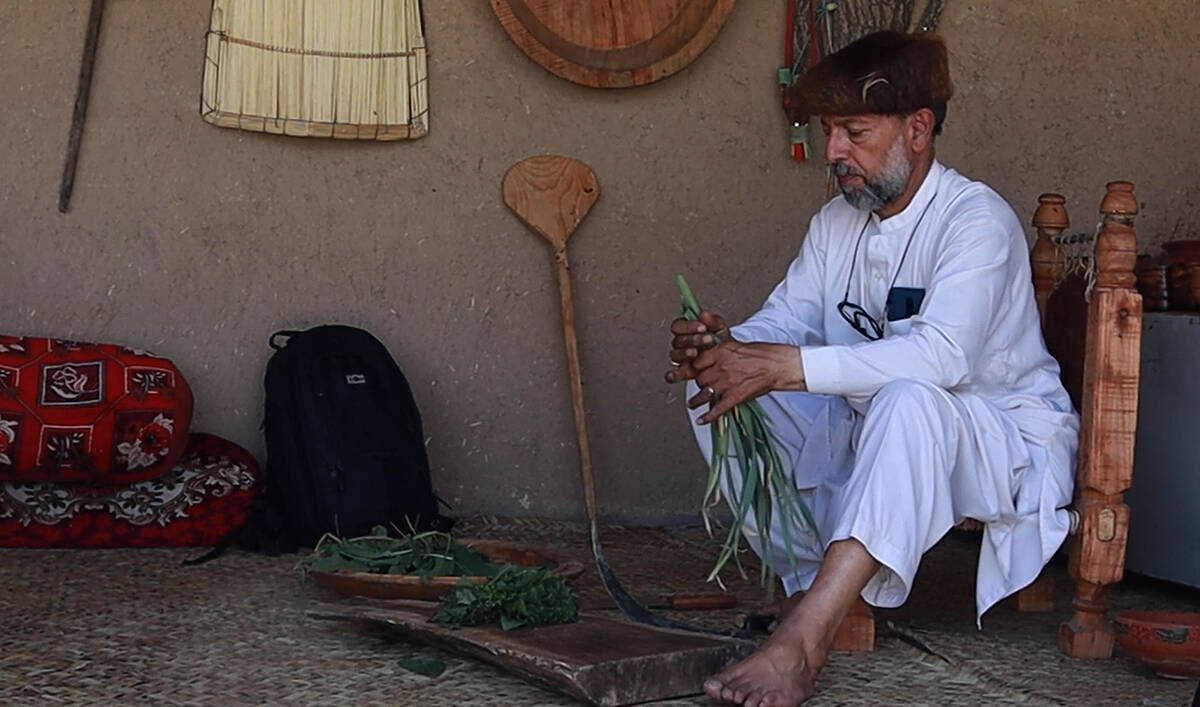
“I had another business, this was my hobby but God gave me a chance and made this a business out of my hobby,” Nasar Khan, the 60-year-old owner, told Arab News at the restaurant which he started six years ago to revive traditional foods from the valley and introduce them to young people.
“I had in mind that our traditional food should be commercialized so that the youth who don’t know about it should get a sense of it, that was the main aim.”
Khan said he served nearly all the traditional foods of Swat, such as warjale, khare, a popular dish made with lamb, tomatoes, garlic and minimal spices cooked in a traditional karahi pan, as well as saag, which is cooked mustard or similar bitter wild greens.
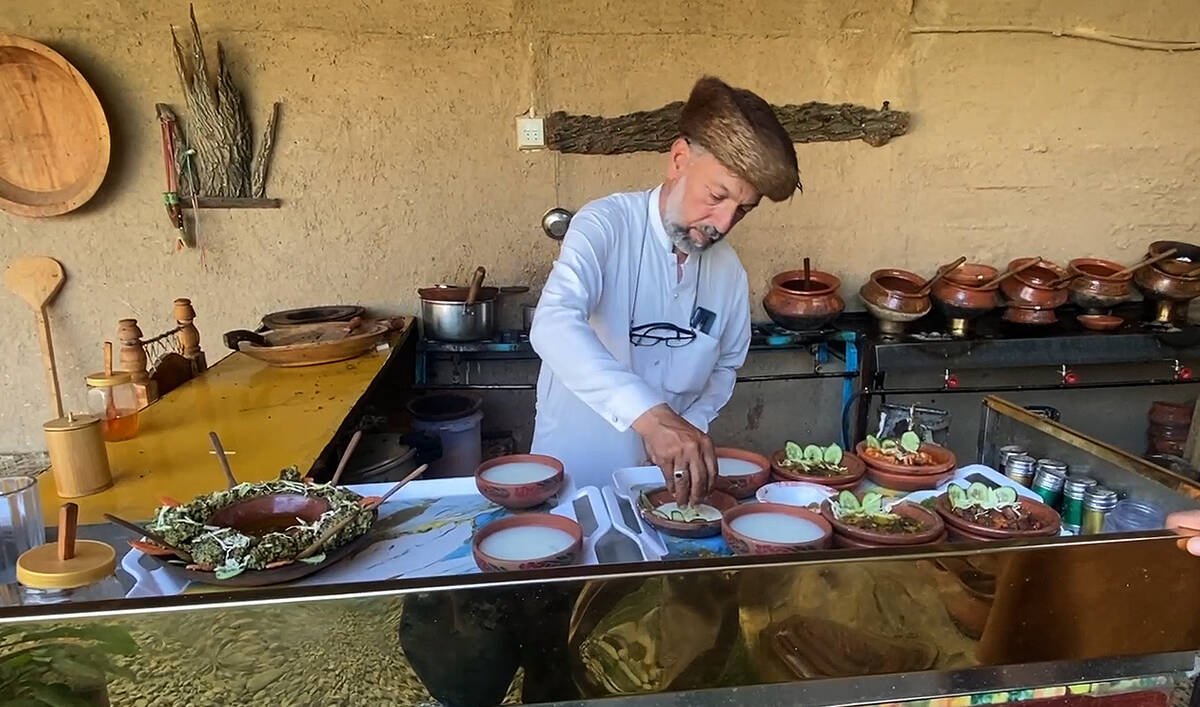
A warjale meal was typically served with desi ghee, fresh cream and a yogurt-based drink called lassi. A portion for two people costs around Rs1,000, less than $1, while a three-person meal costs around Rs1,300.
Cooking warjale was a labor-intensive task, Khan explained.
“Warjale is cooked in a specific kind of saag, which can’t be cultivated but grows naturally,” he said. “The locals then pluck it and cut it in a special way … People of upper Swat call it chukan and those who live in the lower part call it warjale.”
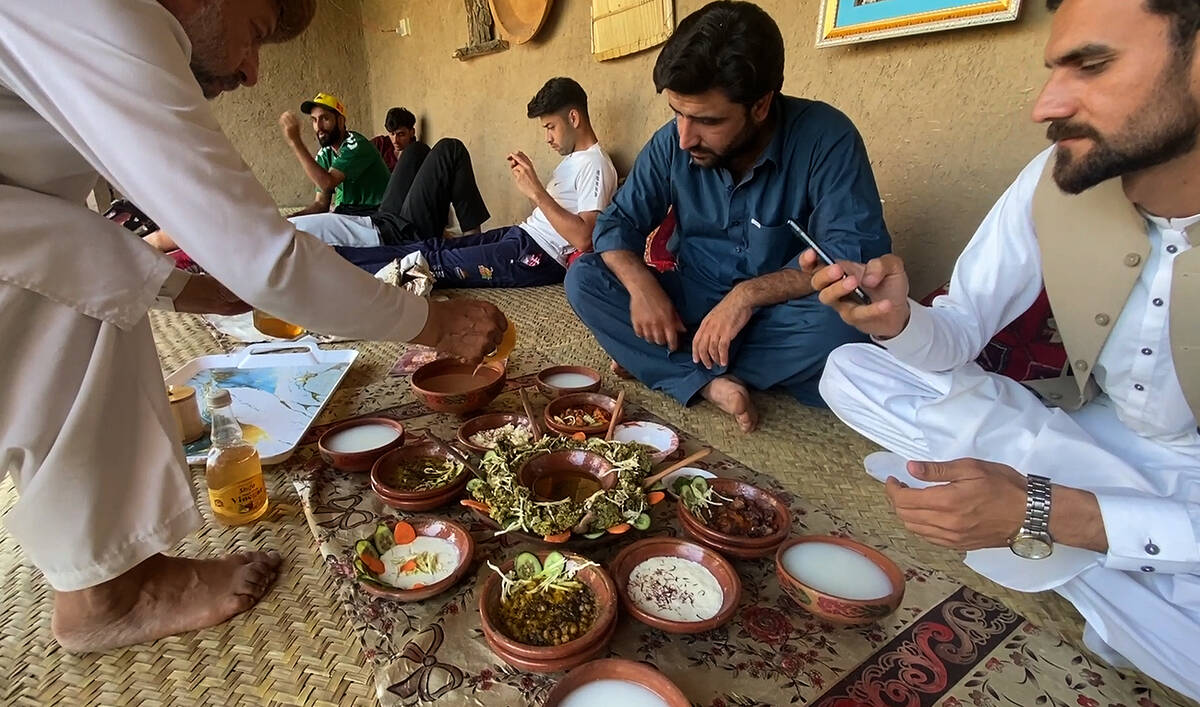
Khan said warjale’s distinct flavor derived from ingredients that could only be sourced in Swat’s environment.
“The soil of Swat is fit for growing [Begami rice], which needs cold weather, fresh water and an environment like this,” he said.
Tourists visiting the restaurant vouched for the unique taste.
Izhar Zeb Yousafzai, a computer science lecturer visiting from Timergara, said he first heard about KTR online:
“We saw some videos about this restaurant on social media. We had a day off today, so we came here with friends ... Warjale was their specialty and we got a chance to eat it after a long time. When we gave it a try, we found its taste delicious.”
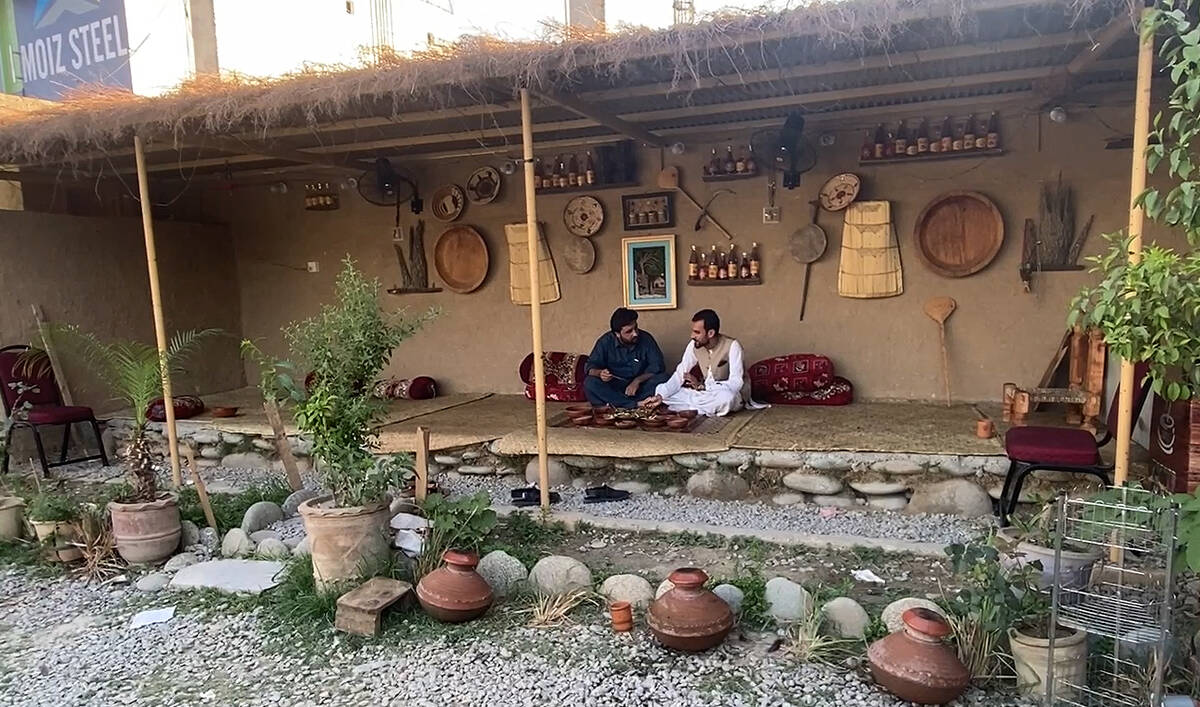
Asad Khan, a 28-year-old resident from Besham in Shangla district, said he had come to Swat for sightseeing before he heard about the restaurant and the dish.
“Warjale is the traditional food of Swat,” he said. “The way it is cooked and then presented with desi ghee, it has an exceptional taste, we can’t explain it.”


